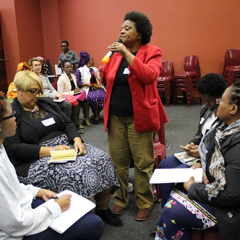Informing a city-led response to migration focusing on social inclusion and participation
[1 October 2017] -- In 2015, Cities Alliance’s Catalytic Fund awarded a grant to Democracy Development Program, the Africa Solidarity Network and the Urban Futures Centre at Durban University of Technology for a project entitled ‘Migration and Shaping the Inclusive City: the case of Durban, South Africa.’ The project’s main goal is to inform a city-led response to migration centred on social inclusion, integration and participation.
In this article we focus on how the project is tackling the gendered nature of xenophobia in the city and how it is contributing to making women's voices heard.
Targeting gender and xenophobia in Durban
Migration in South Africa is frequently perceived to be linked with increased crime, pressure on resources, and unemployment. In this context, xenophobic discourse and behaviour against people perceived as ‘foreigners’ is recurrent, particularly in deprived and under-resourced urban spaces such as Durban’s informal settlements and former apartheid designed townships.
Additionally, South Africa is characterised as a 'patchwork of patriarchies' which complicates and intersects with some of the xenophobic sentiment seen in the country. For example, violent attacks towards ‘foreigners’ are largely perpetrated by young men towards other men. In addition, in many debates and dialogue about social integration and xenophobia, it is the voices of men who are represented. Thus, it is important to understand how ideas of patriarchy, masculinity and femininity feed into xenophobic attitudes and violence.
The city of Durban has no formal local-level policy framework addressing migration and the increased violence towards ‘foreigners.’ In response, the ‘Migration and Shaping the Inclusive City’ project is developing a targeted awareness campaign aimed at shifting this xenophobic sentiment. This includes radio shows and community theatre.
Additionally, through the collection of narratives from migrant women (see below) and facilitation of dialogue sessions, the project pays special attention to women’s experiences and the gendered nature of violence felt in Durban.
Applying a gendered lens to understand violence and underlying masculinity issues
The project applies a gendered lens to analyse the rise of xenophobia in Durban by creating a platform for migrant women to voice their experiences and explore challenges faced by migrant groups in the city.
Understanding the narratives of migrant women in Durban is crucial to creating an inclusive policy framework, as it can help dispel negative stereotypes of migrants within the local government and public sphere. Women’s voices, however, are absent in high-level and community-level discussions. Additionally, migration policies are often biased towards a male-dominated model in which men are the primary breadwinners.
The project aims to remedy this through the collection of oral histories of migrant women in Durban (both South African and from other African countries) as the starting point for reflective dialogue with local stakeholders to discuss policy frameworks.
Starting this discussion with the diverse experiences of migrant women allows for a better understanding of how policies could address cross-cutting issues faced by migrants, including family life, health, education and employment. It also ensures that the intersecting power dynamics and discriminatory behaviours are addressed within the community and at local government level.
The oral histories of women migrants will be available on the project’s website from October. These oral histories were collected by migrant women who were trained by the project as field researchers.
Making a case for inclusive city: Supporting participatory planning in Durban's city policies
Inclusive and participatory planning and decision making remains a challenge within the city of Durban. This is largely due to the state bureaucracy inherited from Apartheid, with rigid operating structures in place. Often, participatory planning means presenting a pre-made plan to the community, with no opportunities for co-design and co-creation.
The project supports inclusive and participatory practices by facilitating dialogue sessions bringing together diverse stakeholders (churches, NGOs, city officials) to debate current challenges around human settlement and inclusive urban planning in Durban.
It also uses a number of innovative and creative mediums of storytelling (community participatory theatre, radio shows, and documentaries) to create platforms for migrant voices to be heard, and to influence government’s awareness of its own practices and policy discussions around integration and inclusion of migrants.
Finally, the project promotes inclusion by focusing on the narratives of both South African women arriving from other regions, and women from other African countries, rather than focusing solely on national identities.
The project’s final strategic report will be shared with the municipality of Durban. The ideas presented in the report will be open to debate in participatory workshops where lessons captured will also be discussed.
The Catalytic Fund is the Cities Alliance global innovation instrument providing grant support for innovative projects that strengthen and promote the role of cities in poverty reduction and in sustainable urban development. For further information, please contact Lisa Reudenbach (lreudenbach@citiesalliance.org)

Dialogue session held in Durban, South Africa. Photo: Democracy Development Program NPC
Understanding the narratives of migrant women in Durban is crucial to creating an inclusive policy framework, as it can help dispel negative stereotypes of migrants within the local government and public sphere.
Related Items
Cities Alliance JWP for Gender Equality
Cities Alliance Catalytic Fund




